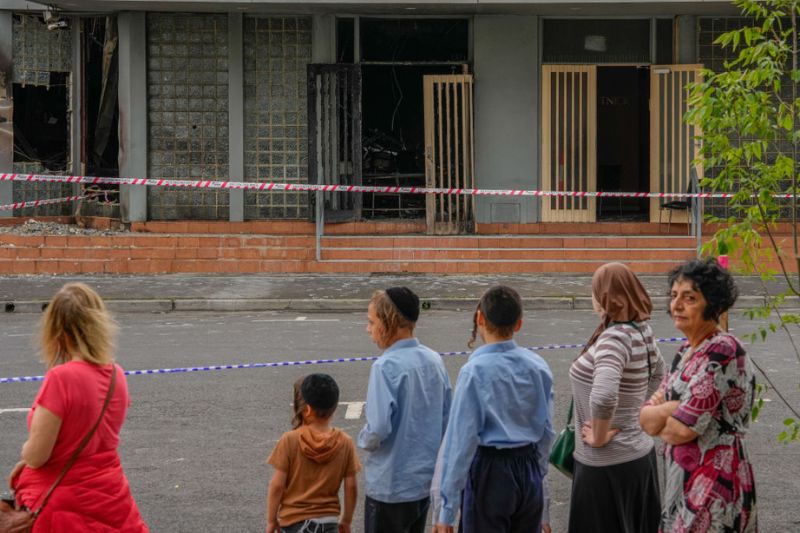The firebombing of the Adass Israel Synagogue in Melbourne rightly drew condemnation and shock from Australians of every level. Although the circumstances and the mindset of those who destroyed the Synagogue remain unknown at the time of writing, the action almost certainly reflected hatred of Judaism and of the people who worshiped there. They form a tightly knit local community formed initially of East European Jews who had escaped the Holocaust, distinctive in their dress and strict adherence to Jewish law and customs. The Synagogue had also been burned thirty years ago, and this latest violation was clearly antisemitic in motivation.

That said, the burning of the Synagogue took place in a volatile and passionate climate in which the Hamas invasion killings and taking of hostages, followed by the Israeli invasion of Gaza and its associated destruction of lives and property, sparked grief and anger among both Jewish and Middle Eastern communities in Australia. This found expression in prejudice against both Jews and Muslims. Those who see the Jewish occupation of Gaza as a conflict between Judaism and Islam, in which one must choose sides without qualification, will use the burning of the Synagogue to press their case.
A much more helpful way to reflect on the burning of the synagogue is to make relevant distinctions between government leaders, military, peoples and religions, and then to enter the lives of the people affected by it and so the memories and culture that colour their experience. An attack on any place of worship affects people deeply. It is the focal point of meaning and of behaviour; it is the gathering place of their community; it embodies the history of the community and the personal histories of families who grew up in it.
For the Adass Israel community whose life is shaped by the Synagogue its violation is the more distressing. The history of their community traces back to the Holocaust in which their relatives and friends were killed because of their race and religion. The hatred that culminated in their mass killing had its seeds in the destruction of their places of worship. For the community, the promise of Never Again made after the Holocaust must now seem to have been eroded into Yet Again. Whatever may have been the associations and motivation of the arsonists, the people targeted in it can only experience it as an act of murderous hatred of them and of their fellow Jews. It is the more cruel because it follows the murder and hostage taking of their fellow Jews in Israel. Other Jewish communities will naturally share their outrage and their fears.
The destruction of the Synagogue will also affect the Palestinian and other Middle Eastern and Muslim communities in Australia. We should also try to enter their experience from inside. They have seen their fellow Palestinians bombed, made homeless and driven from their homes by the Israeli army in its response to the Hamas violence. They have seen the dismissive response of the Israeli Government and of its backers to international legal judgments of their actions. They have also experienced discrimination in Australia. Those who are more generous than we have any right to expect will sympathise with those who have lost their Synagogue, having themselves lost so much.
The desecration of the Synagogue also affects all of us Australians. In religious and civic terms our Jewish and Muslim fellow citizens, and immigrants from the Middle East and Israel, are our brothers and sisters. Their pain is our pain, their hope for a more just world is our hope.
We rightly feel outrage at the burning of the Synagogue because it so affects our fellow citizens. We are also rightly even more horrified because of its association with one of the deepest violations and denials of the shared humanity of all human beings in human history. All our laws and relationships depend on the assumption that all human beings have rights by virtue of being human. When seen against that background, the burning of the Synagogue is a crime against humanity, not only against Australian law. Representatives of our Government have rightly accepted the responsibility to acknowledge its seriousness on our behalf.
'An attack on any place of worship affects people deeply. It is the focal point of meaning and of behaviour; it is the gathering place of their community; it embodies the history of the community and the personal histories of families who grew up in it.'
As Australians, too, we enjoy the privilege of welcoming both Jewish and Israeli immigrants and the communities they have built. We are also privileged not to be involved in the war engulfing the nations that have been their home. That privilege lays on us the responsibility to encourage international initiatives for peace and for the end of killing in Gaza and Lebanon. It entails refusing to identify ourselves totally with either side in the conflict, but invites us rather to consider the ethical and legal justification of the goals of the warfare waged by the armed forces of both sides and of the actions taken to achieve them. Such consideration demands that we make proper distinctions between government leaders, the military, the peoples and their religions in the way in which we respond to the conflict.
In the face of considerable pressure, the Australian Government has avoided identifying ourselves totally with either side in that conflict. We should commend it.
Andrew Hamilton is consulting editor of Eureka Street, and writer at Jesuit Social Services.
Main image: Members of the local Jewish community look at the damage of the attack at the Adass Israel Synagogue on December 06, 2024 in Melbourne, Australia. AN attack on the Adass Israel Synagogue in Melbourne forced congregants to flee as flames engulfed the building early on Friday morning. (Photo by Asanka Ratnayake/Getty Images)